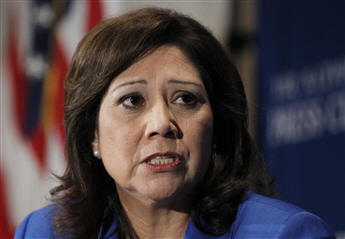A Labor Chief As Clueless As The President
On Aug. 31, with job creation grinding to a complete halt, U.S. Labor Secretary Hilda Solis was asked this question: "Why do you think there have been so many jobs created in the last decade in Texas?"
She laughed and said, "Come again."
The questioner rephrased his query, adding a citation: "The Federal Reserve Bank of Dallas estimates about half of the jobs created in the U.S. in the last decade have been created in Texas. Why do you think that is?"
Replied Solis, "I haven't done a lot of research in terms of the economic growth in Texas."
It appears that Labor Secretary Solis had no interest in looking at how a state with 8% of the nation's population had created nearly half of the nation's new jobs over the past 10 years.
That interchange occurred on the final day of a month in which the United States experienced zero net job growth — the first time that's happened in the U.S. since 1945.
Extending her reply about not doing much research on job growth in Texas, Solis added, "I do know that they have different, ah, scales of pay."
Everyone, of course, has "different scales of pay," even the old commies in Cuba.
"Um, it's a right-to-work state, I know that," continued Solis, sounding more like a struggling student than a U.S. labor secretary.
"We're also aware that the oil industry has done very well in this recession and those jobs continue to increase," said Solis, "and that's another area that continues to grow during this recession."
There could have been good follow-up questions at that point, but they weren't asked: If right-to-work and oil are the reasons for extraordinary job creation, why does the Obama administration oppose both?
With jobs so hard to come by, why is the administration blocking off-shore drilling, and why is the National Labor Relations Board doing everything it can to shut down the new Boeing plant in right-to-work South Carolina?
"I would just say, on the whole, that's my understanding," continued Solis, referring to oil and right-to-work.
She didn't mention that Texas had enacted pro-business tort reforms and regulatory rollbacks. She also didn't mention that Texas has no personal income tax and no corporate income tax.
Solis concluded by saying she was invited to Texas some time back by "advocates" and "stakeholder groups" and held a "summit" in which they talked about things like "wage theft."
I don't know what "wage theft" is, but I doubt if it's as important to job growth as a business-friendly regulatory approach, tort reform, zero corporate income taxes and zero personal income taxes.
Criticizing Texas from a different angle, a Bloomberg View editorial in July said, "Texas created almost 250,000 jobs in the past two years, nearly as many as the other 49 states combined," but that "it would be a mistake to think the state might serve as a national model."
The problem was wages at the bottom: "In high-skill professions, such as management and petroleum engineering, Texas salaries often exceed national norms," but "hourly workers have earned 4% to 7% less than their counterparts nationwide."
The Bloomberg editorial left out that the cost of living in Texas is 12% lower than the U.S average, so that a Texas dishwasher, on average, can buy more pizzas and movie tickets with a day's work than his dishwashing counterparts in the rest of America.
Bottom line, there's no shortage of amateurish thought when it comes to understanding basic economics and how jobs are created and destroyed in the private sector of the U.S. economy.
President Obama started this term in office with no experience in the private sector, no experience in job creation and seemingly no understanding of how something like ObamaCare throws a wet blanket on private-sector investment, economic growth, small business expansion, entrepreneurial startups and overall job creation.
With that hole in his knowledge, especially on the top issue of the day, it would have been wise to pick a labor secretary who didn't mirror his own inadequacies.
• Reiland is an associate professor of economics and the B. Kenneth Simon professor of free enterprise at Robert Morris University in Pittsburgh.


